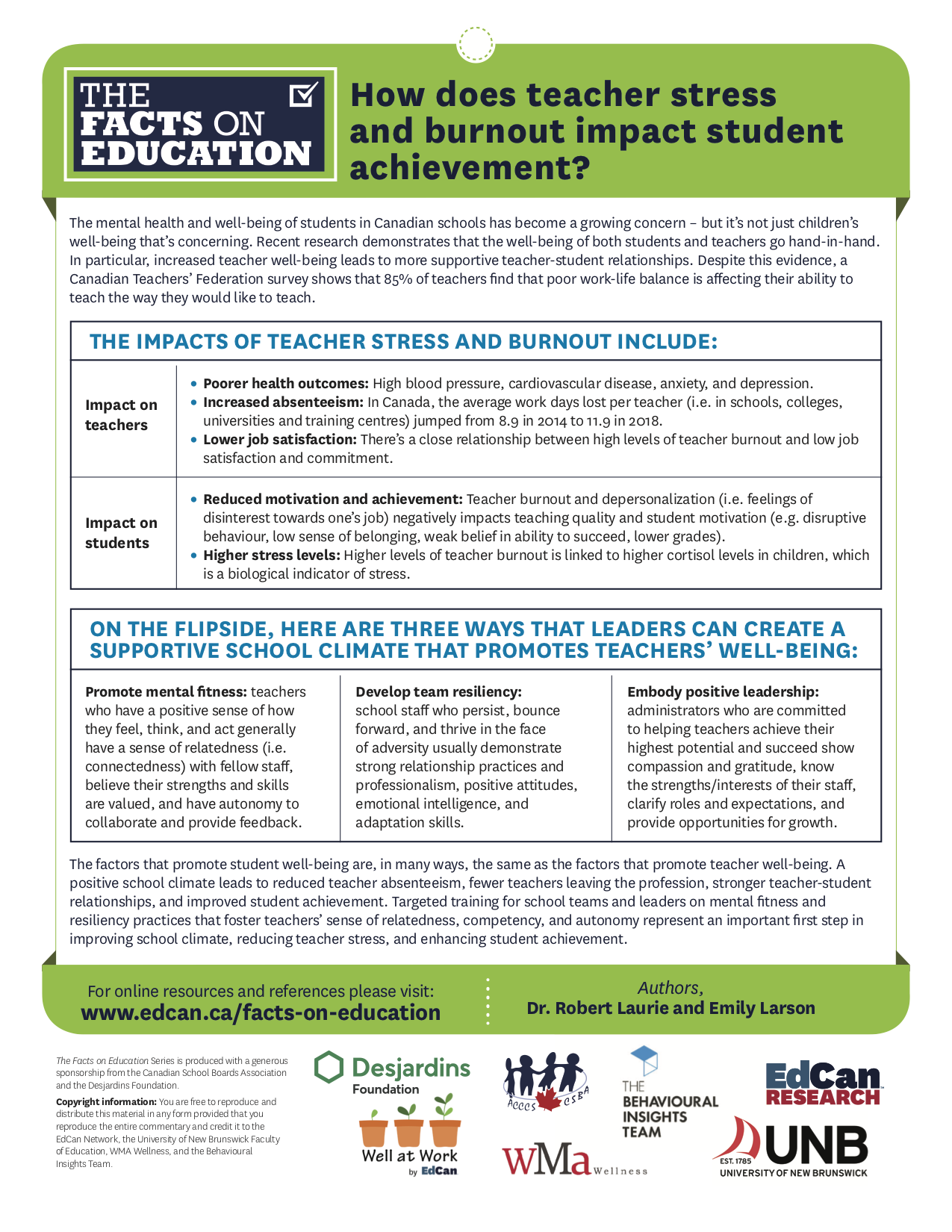How does teacher stress and burnout impact student achievement?
How does teacher stress and burnout impact student achievement?
By: Robert Laurie, Ph. D., Emily Larson
Date: May 12, 2020
Download the Fact Sheet!
The mental health and well-being of students in Canadian schools has become a growing concern – but it’s not just children’s well-being that’s concerning. Recent research demonstrates that the well-being of both students and teachers go hand-in-hand. In particular, increased teacher well-being leads to more supportive teacher-student relationships. Despite this evidence, a Canadian Teachers’ Federation survey shows that 85% of teachers find that poor work-life balance is affecting their ability to teach the way they would like to teach.
THE IMPACTS OF TEACHER STRESS AND BURNOUT INCLUDE:
IMPACT ON TEACHERS
Poorer health outcomes: High blood pressure, cardiovascular disease, anxiety, and depression.
Increased absenteeism: In Canada, the average work days lost per educator (i.e. in schools, colleges, universities and training centres) jumped from 8.9 in 2014 to 11.9 in 2018.
Lower job satisfaction: There’s a close relationship between high levels of teacher burnout and low job satisfaction and commitment.
IMPACT ON STUDENTS
Reduced motivation and achievement: Teacher burnout and depersonalization (i.e. feelings of disinterest towards one’s job) negatively impacts teaching quality and student motivation (e.g. disruptive behaviour, low sense of belonging, weak belief in ability to succeed, lower grades).
Higher stress levels: Higher levels of teacher burnout is linked to higher cortisol levels in children, which is a biological indicator of stress.
ON THE FLIPSIDE, HERE ARE THREE WAYS THAT LEADERS CAN CREATE A SUPPORTIVE SCHOOL CLIMATE THAT PROMOTES TEACHERS’ WELL-BEING:
PROMOTE MENTAL FITNESS:
Teachers who have a positive sense of how they feel, think, and act generally have a sense of relatedness (i.e. connectedness) with fellow staff, believe their strengths and skills are valued, and have autonomy to collaborate and provide feedback.
DEVELOP TEAM RESILIENCY:
School staff who persist, bounce forward, and thrive in the face of adversity usually demonstrate strong relationship practices and professionalism, positive attitudes, emotional intelligence, and adaptation skills.
EMBODY POSITIVE LEADERSHIP:
Administrators who are committed to helping teachers achieve their highest potential and succeed show compassion and gratitude, know the strengths/interests of their staff, clarify roles and expectations, and provide opportunities for growth.
The factors that promote student well-being are, in many ways, the same as the factors that promote teacher well-being. A positive school climate leads to reduced teacher absenteeism, fewer teachers leaving the profession, stronger teacher-student relationships, and improved student achievement. Targeted training for school teams and leaders on mental fitness and resiliency practices that foster teachers’ sense of relatedness, competency, and autonomy represent an important first step in improving school climate, reducing teacher stress, and enhancing student achievement.
WITH THE GENEROUS FINANCIAL SUPPORT OF:
Additional Resource Information
Work-Life Balance and the Canadian Teaching Profession by Bernie Froese-Germain via Canadian Teachers’ Federation
Three key conditions to create a healthy workplace by Bill Morrison via The Globe and Mail
Infographic: The Positive Workplace Framework (PWF) via Well at Work by EdCan
References
Burke, R., Greenglass, E., & Schwarzer, R. (1996). Predicting teacher burnout over time: Effects of work stress, social support, and self-doubts on burnout and its consequences. Anxiety, Stress & Coping: An International Journal, 9(3), 261-275. doi: https://doi.org/10.1080/10615809608249406
Briner, R., & Dewberry, C. (2007). Staff well-being is key to school success. London: Worklife Support Ltd/Hamilton House.
Darr, W., and Johns, G., (2008). Work strain, health, and absenteeism: A meta-analysis. Journal of Occupational Health Psychology,13(4), 293-318. doi: https://doi.org/10.1037/a0012639
Hoglund, W. L., Klingle, K. E., & Hosan, N. E. (2015). Classroom risks and resources: Teacher burnout, classroom quality and children’s adjustment in high needs elementary schools. Journal of School Psychology, 53(5), 337-357. doi: 10.1016/j.jsp.2015.06.002
Jennings, P.A., Brown, J. L., Frank, J. L., Doyle, S., Oh, Y., Davis, R., DeMauro, A. A. & Greenberg, M. T. (2017). Impacts of the CARE for teachers program on teachers’ social and emotional competence and classroom interactions. Journal of Educational Psychology, 109(7), 1010–1028. doi: http://dx.doi.org/10.1037/edu0000187
Laurie, R. (2019, December). Measuring school well-being: The mental fitness and resiliency inventory and the School Happiness Index (SHI). Education Canada Magazine, 59(4). Retrieved from: https://www.edcan.ca/articles/measuring-school-well-being
Laurie, R., Morrison, B. & Peterson, P. (2019, December). The Positive Workplace Framework (PWF): A strengths-based approach for thriving schools. Education Canada Magazine, 59(4). Retrieved from: https://www.edcan.ca/articles/the-positive-workplace-framework/
McLean, L., & Connor, C. M. (2015). Depressive symptoms in third‐grade teachers: Relations to classroom quality and student achievement. Child Development, 86(3), 945-954. doi: 10.1111/cdev.12344
Miller, R. (2012). Teacher absence as a leading indicator of student achievement: New national data offer opportunity to examine cost of teacher absence relative to learning loss. Washington, DC: Center for American Progress.
Miller, R., Murnane, R., & Willett, J. (2008). Do teacher absences impact student achievement? Longitudinal evidence from one urban school district. Educational Evaluation and Policy Analysis, 30(2), 181-200. doi: https://doi.org/10.3102/0162373708318019
Molero Jurado, M. D. M., Pérez-Fuentes, M. D. C., Atria, L., Oropesa Ruiz, N. F., & Gázquez Linares, J. J. (2019). Burnout, perceived efficacy, and job satisfaction: Perception of the educational context in high school teachers. BioMed research international, 2019. doi: 10.1155/2019/1021408
Núñez, J. L., Fernández, C., León, J., & Grijalvo, F. (2015). The relationship between teacher’s autonomy support and students’ autonomy and vitality. Teachers and Teaching: Theory and Practice, 21(2), 191-202. doi: https://doi.org/10.1080/13540602.2014.928127
Oberle, E., & Schonert-Reichl, K. A. (2016). Stress contagion in the classroom? The link between classroom teacher burnout and morning cortisol in elementary school students. Social Science & Medicine, 159, 30-37. doi: 10.1016/j.socscimed.2016.04.031
Roffey, S. (2012). Pupil Wellbeing – Teacher Wellbeing: Two sides of the same coin. Educational & Child Psychology, 29(4), 8-17. Retrieved from: https://www.sueroffey.com/wp-content/uploads/import/32-Roffey%20ECP29-4.pdf
Ronfeldt, M., Loeb, S., & Wyckoff, J. (2013). How teacher turnover harms student achievement. American Educational Research Journal, 50(1), 4-36. doi: https://doi.org/10.3102%2F0002831212463813
Statistics Canada. (2020). Work absence of full-time employees by industry, annual. Retrieved from: https://www150.statcan.gc.ca/t1/tbl1/en/tv.action?pid=1410019101
Meet The Expert
Robert Laurie, Ph. D.
Robert Laurie, PhD, is Adjunct Professor at the University of New Brunswick and President of REL Consultants Inc. He has extensive teaching experience in public schools and university settings as well as provincial, national and international experience in the area of large-scale assessments. He was instrumental in validating the Mental Fitness and Resiliency Inventory in both English and French.
Emily Larson
Emily is a Senior Advisor at BIT North America. While at BIT London, Emily led the schools and wellbeing brief. Emily has worked on reducing burnout, increasing parental engagement and using edtech to reduce teacher workload.






